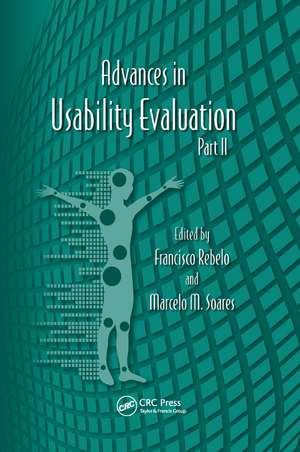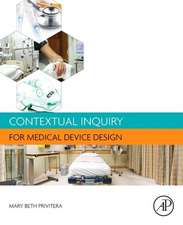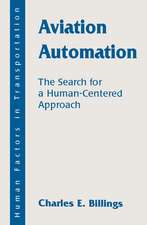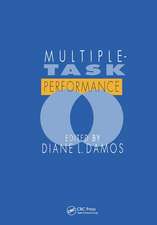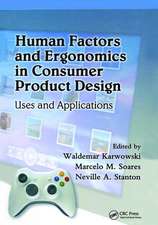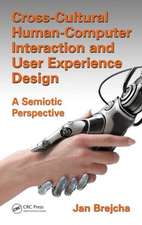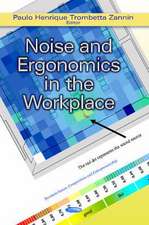Advances in Usability Evaluation Part II
Editat de Francesco Rebelo, Marcelo M. Soaresen Limba Engleză Paperback – 24 oct 2019
The book is organized into four sections that focus on the following subject matters:
• Usability Methods and Tools
• Theoretical Issues in Usability
• Usability in Web Environment
• Miscellaneous
In the section Usability Methods and Tools, studies related with new and improved methods and tools for the advancement in the efficiency of the usability studies is reported. In this context, this book provides studies, which cover everything from checklists and heuristics development to kaizen and biometrics measurement techniques. Also, the use of tools, like eye tracker, virtual reality and augmented reality is discussed.
The section Theoretical Issues in Usability concentrates on theorical approaches of usability that allow justifying the impact of usability in our lives. Review studies about the importance of usability and connections between ergonomics and virtual reality were reported. General approaches raised the concepts of modeling and simulation to explain changes in human performance and accidents.
The section Usability in Web Environment concentrates on studies associated with the use of the Internet environment and mainly discusses the development of new services and creates social communities. The section Miscellaneous shows various studies that focus on aesthetic, affective and emotional design, corporate and inclusive design.
| Toate formatele și edițiile | Preț | Express |
|---|---|---|
| Paperback (1) | 516.60 lei 6-8 săpt. | |
| CRC Press – 24 oct 2019 | 516.60 lei 6-8 săpt. | |
| Hardback (1) | 1131.14 lei 6-8 săpt. | |
| CRC Press – 17 iul 2012 | 1131.14 lei 6-8 săpt. |
Preț: 516.60 lei
Preț vechi: 607.76 lei
-15% Nou
Puncte Express: 775
Preț estimativ în valută:
98.87€ • 102.43$ • 82.51£
98.87€ • 102.43$ • 82.51£
Carte tipărită la comandă
Livrare economică 21 martie-04 aprilie
Preluare comenzi: 021 569.72.76
Specificații
ISBN-13: 9780367381080
ISBN-10: 0367381087
Pagini: 660
Dimensiuni: 156 x 234 x 33 mm
Greutate: 1.21 kg
Ediția:1
Editura: CRC Press
Colecția CRC Press
ISBN-10: 0367381087
Pagini: 660
Dimensiuni: 156 x 234 x 33 mm
Greutate: 1.21 kg
Ediția:1
Editura: CRC Press
Colecția CRC Press
Public țintă
Academic and Professional Practice & DevelopmentCuprins
Section I: Usability Methods and Tools
Using Space Exploration Matrices to Evaluate Interaction with Virtual Environments, L. Teixeira, E. Duarte, J. Teles, M. Vital, F. Rebelo and F. Moreira da Silva
Measuring and Managing the Consistency and Effectiveness of Checklists Used to Assess Jobs at Risk for Musculoskeletal Disorders, T. Albin
Can Virtual Reality Methodologies Improve the Quality of Life of People with Disabilities? L. Braccialli, F. Rebelo and L. Pereira
A Proposal of Usability Task Analysis for User Requirements and Evaluation, T. Yamaoka
An Application of the Objects' Layout Optimization Models in an Ergonomic Analysis - A Case Study, J. Koszela, J. Grobelny and R. Michalski
Eye Movement and Environmental Affordances in a Emergency Egress Task: A Pilot Study, P. Noriega, E. Vilar, F. Rebelo, L. Pereira and I. Santos
Comparing Likert and Pictorial Scales to Assess User Feedback, F. Campos, R. Belfort and W. Correia
Evaluation of Safety and Usability in Projectual Methodologies with Focus on Design of Physical Artifacts, W. Correia, F. Campos, M. Soares and M. Barros
Drillis and Contini Revisited, J. Peacock, M. Aravindakshan, T. Xin, C. Ping, L. Ping, F. Ding, , T. Chuan, Singapore, M. Hartono, Indonesia, and N. Stella
Usability Evaluation of a Virtual Reality System for Motor Skill Training, W. Jeon, M. Clamann, B. Zhu, G.-H. Gil and D. Kaber
"ERGOMASTER" - The Software Solution to Ergonomic Design of UI, J. Bessonova, A. Oboznov and A. Bakanov
Proposal of Human Interface Architect Framework – Application Human-Centered Design Process To Software / System Development Process, S. Fukuzumi and Y. Tanikawa
A Study on the Interaction Styles of an Augmented Reality Game for Active Learning with a Folk Festival Book, C.-W. Chiang and L.-C. Chen
UX Embodying and Systematizing Method to improve user experience in sys
Using Space Exploration Matrices to Evaluate Interaction with Virtual Environments, L. Teixeira, E. Duarte, J. Teles, M. Vital, F. Rebelo and F. Moreira da Silva
Measuring and Managing the Consistency and Effectiveness of Checklists Used to Assess Jobs at Risk for Musculoskeletal Disorders, T. Albin
Can Virtual Reality Methodologies Improve the Quality of Life of People with Disabilities? L. Braccialli, F. Rebelo and L. Pereira
A Proposal of Usability Task Analysis for User Requirements and Evaluation, T. Yamaoka
An Application of the Objects' Layout Optimization Models in an Ergonomic Analysis - A Case Study, J. Koszela, J. Grobelny and R. Michalski
Eye Movement and Environmental Affordances in a Emergency Egress Task: A Pilot Study, P. Noriega, E. Vilar, F. Rebelo, L. Pereira and I. Santos
Comparing Likert and Pictorial Scales to Assess User Feedback, F. Campos, R. Belfort and W. Correia
Evaluation of Safety and Usability in Projectual Methodologies with Focus on Design of Physical Artifacts, W. Correia, F. Campos, M. Soares and M. Barros
Drillis and Contini Revisited, J. Peacock, M. Aravindakshan, T. Xin, C. Ping, L. Ping, F. Ding, , T. Chuan, Singapore, M. Hartono, Indonesia, and N. Stella
Usability Evaluation of a Virtual Reality System for Motor Skill Training, W. Jeon, M. Clamann, B. Zhu, G.-H. Gil and D. Kaber
"ERGOMASTER" - The Software Solution to Ergonomic Design of UI, J. Bessonova, A. Oboznov and A. Bakanov
Proposal of Human Interface Architect Framework – Application Human-Centered Design Process To Software / System Development Process, S. Fukuzumi and Y. Tanikawa
A Study on the Interaction Styles of an Augmented Reality Game for Active Learning with a Folk Festival Book, C.-W. Chiang and L.-C. Chen
UX Embodying and Systematizing Method to improve user experience in sys
Notă biografică
Francisco Rebelo, Marcelo M. Soares
Descriere
Successful interaction with products, tools, and technologies depends on usable designs, accommodating the needs of potential users and does not require costly training. In this context, this book covers emerging concepts, theories and applications of human factors knowledge focusing on the discovery and understanding of human interaction with products and systems for their improvement. It focuses on the following subjects: usability methods and tools; theoretical issues in usability; and usability in web environment.
